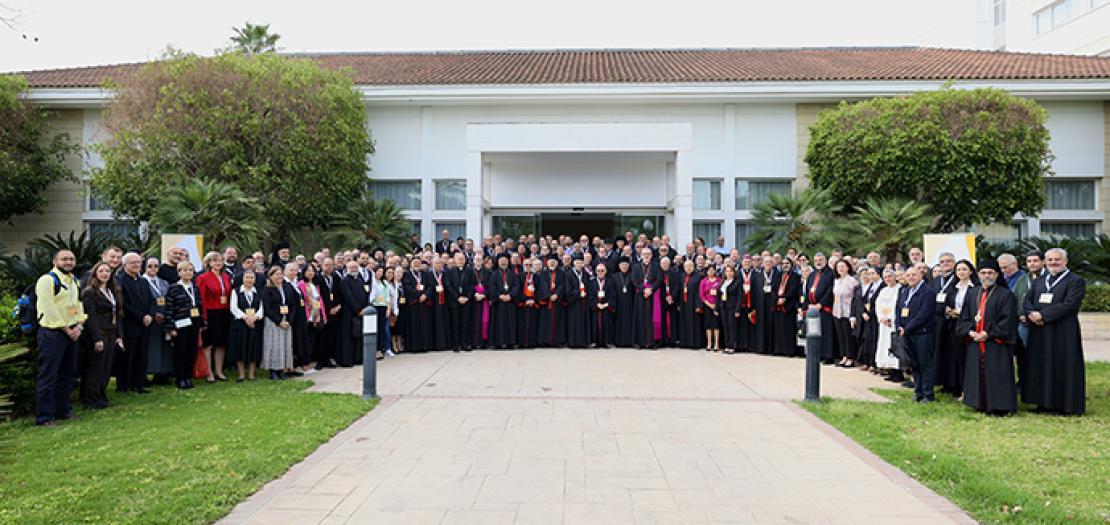Issued by the Catholic Center for Studies and Media - Jordan. Editor-in-chief Fr. Rif'at Bader - موقع أبونا abouna.org
The Churches of the East are rooted in hope
More than ten years have elapsed since the late Pope Benedict XVI signed an important document, namely “The Catholic Church in the East, Communion and Witness.” He signed it in Beirut during his historic visit in September 2012. For this reason, the Catholic Churches of the East convened under the slogan: “Rooted in Hope” at the invitation of the Latin Patriarchate--whose spiritual authority extends in Jordan, Palestine and the island of Cyprus--in Nicosia in April 2023 for four days. The sessions included discussions, reflections, dialogues and prayers, organized by the Latin Patriarchate in Jerusalem, whose spiritual care extends to the churches of the island of Cyprus, and were held under the chairmanship of Prefect of the Dicastery for the Eastern Churches and President of the Conference Archbishop Claudio Gugerotti who assumed this position only a few months ago. It was the first public meeting between him and the Churches of the East in Cyprus this week. The participants in the sessions sensed the “new path” that he wants to follow in this dicastery that is associated with issues relevant to the Churches of the East.
The first decade that followed the signing of this “Apostolic Exhortation” was not easy, or rather violent for the people of the East in general, and for Christians in particular, where despite their small numbers they have affected by acts relevant to emigration and forcible displacement. Their numbers have drastically dropped over the past decade with more than two million people are currently dispersed in all parts of the world. Two weeks ago, while the world celebrated the Feast of Easter, there was a live broadcast from several churches in Australia which were filled with Arab believers, especially from fraternal Iraq, where a strong Arab Christian community has formed there.
So, the conference convened at a time when the number of emigrant Christians of the East is almost equal to the number of those who remained in their countries of origin and who want to live there through thick and thin with the citizens with whom they share the same political and socio-economic conditions.
In the presence of the patriarchs of the East who represent the seven Catholic Churches, the apostolic nuncio to Jordan and Cyprus, and the apostolic nuncio in Jerusalem, we listened in Cyprus to several interventions and lectures about the Christian reality and the aspirations in our dear East, a reality that engulfs several joyful affairs and an upscale presence through the institutions that have been operating centuries ago in the service of societies where Christians are located. They are spiritual institutions represented by Churches; educational institutions such as schools, institutes and universities; and humanitarian institutions operating to serve poor citizens or the suffering refugees coming from their country of origin. There are also media institutions that have developed in the past decade. Furthermore, Mr. Nadim Amman, head of the International Missionary Department in the German Diocese of Cologne, lauded the abouna.org website, stating that “it provides its services to people of all age groups in a language that is understandable to all.” At any rate, all these institutions provide service fairly and without discrimination to different races and religions.
On the other hand, there are common sufferings, which the Prefect of the Dicastery for the Eastern Churches referred to as “a long way of the Cross”, that the Christians of the East have been exposed to, as they were subjected, in separate periods of time and in some countries to forced displacements that differ from one region to another. The Israeli occupation, on the one hand, vacated Christian of the city of Jerusalem and other Palestinian towns and cities, while ISIS militants forcibly displaced the Christians of the Nineveh Plain and Mosul on the other hand.
The future remains in the hands of Almighty God, and no one can give clear guarantees whether the future will be trouble-free. Therefore, the Christians of the East find in the “virtue of hope” their peace, roots, and reassurance, which are not related to temporal hopes, but rather to the coming kingdom. It is also linked to two inseparable factors, namely the faith that acquired while scented with the blood of the martyrs, as well as the love that is based on justice and the values of peace, even though they seem absent. However, those in charge of the conference did well to choose a slogan marking these days, namely “rooted in hope.”







